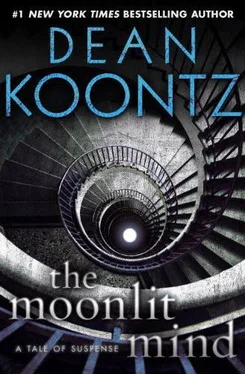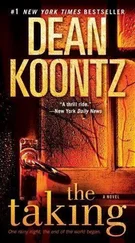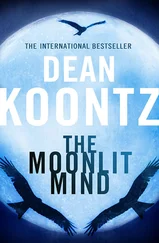If not for what happens when she’s holding the scissors with the blades sunk in the killer, she would scream into the night and seek help from neighbors. But in that instant when she and the psychopath are linked by blood and steel, she has a flash vision of herself perhaps a year older, in a house that belongs to her aunt and uncle, both of them on the floor, their faces disarranged by bullets. She sees herself, too, on her knees in that carnage, begging for her life as this same lunatic presents her with a fresh costume that he wants her to wear.
Mind, heart, and soul, she knows that this premonition is true, that the police will not catch him, that continuing to be Daisy Jean Sims will be the death of her and the death of still more people whom she loves.
Racing down the front-porch steps, the mantilla flying off her head, she does the last thing the killer will expect: runs not away from the house but instead around it. Occasionally her father sits on the back porch to have a beer before bed. He isn’t much of a drinking man, and if he has two, he sometimes forgets to lock the door when he retires for the night. Sure enough, it’s unlocked, ajar, suggesting that the killer entered the house this way.
She crosses the kitchen and warily peers into the downstairs hall. At the farther end of the house, the psychopath leaves by the front door.
Now she proves that her mettle is second to none. Shuddering with terror, wrenched by grief, she makes her way to her parents’ bedroom, where in the company of the beloved dead, she locates her father’s wallet and her mother’s purse, taking what money they contain. Like many people in these uncertain times, her parents have purchased some gold coins, which are kept under the false bottom of a desk drawer in the den. She takes those eight Canadian Maple Leafs as well, and then returns to her bedroom.
Either she is half insane and reckless with anguish, therefore not thinking clearly, or she is thinking more clearly than she has ever thought before. She won’t know which is true for a long time to come.
She puts the coins and most of the money in a small suitcase and quickly packs jeans, sweaters. Because her all-white and dated outfit might call attention to her, she shrugs into a raincoat. Carrying the suitcase with her left hand, she has the fortitude to stoop and pick up the bloody scissors with her right, holding them ready in the event that the killer has been unwise enough to linger.
She leaves by the back door, crosses the deep rear yard, hurries alongside the garage and through a gate into an alleyway.
The moon that night is a crescent and appears to be as sharp as the Italian kitchen knife that her mother calls a mezzaluna.
Thirty minutes later, in a deserted bus-station bathroom, Daisy Jean Sims chops her long hair short. She changes into blue jeans, a sweater, a pair of running shoes.
She purchases hair dye and a few other items at an all-night supermarket. Before dawn, alone in a public restroom in Statler Park, she transforms blond to raven.
The slaughter at the Sims house is not discovered until two-fifteen that afternoon. Judging by his bloody handprints and a single shoe print, police believe the killer is a tall man with unusually large hands, physically formidable. Because his prints are found, as well, in Daisy’s room, and because the girl is missing, the assumption is made that she has been kidnapped.
Trusting that her shaggy black hair will, for the moment, serve as an adequate disguise, she visits the main city library both with the hope that its quiet will settle her nerves and with the intention to do some research.
First she reads about predictive clairvoyance, but those who have written on the subject generally treat it as mere fantasy or as a possibility that has validity only because it might be predicted by some more liberal interpretations of Jungian psychological theory, whatever the hell that might be. There’s a third group that writes with gosh-wow enthusiasm that seems to be a cheesy attempt to sell books to the gullible.
She knows that what she foresaw when she plunged the scissors into the killer was neither a fantasy nor a Jungian whatever. It was the most intense and truest experience of her life. If she lives as Daisy Jean Sims, she will be found, she will be killed, and people she loves will die with her.
After putting aside the books on clairvoyance, she researches names, the history and the meaning of them. Without being able to explain to herself why , she believes that she must choose her new name with care, that the right name will make her safe, that the wrong name will leave her vulnerable.
By the time the library closes, she decides to rename herself Amity Onawa. Amity, from the Latin amicitia , means “friendship.” Onawa, a North American Indian word, means “wide awake girl.”
In her new and terrible loneliness, the name Amity — friendship — speaks to what she hopes to give and receive. And after the hideous experiences of the night just passed, she seems to have come out of a lifelong half sleep; she is now as wide awake as any girl has ever been, wide awake to the fact that the world is more dangerous and far stranger than she had previously realized.
She is one month past her fourteenth birthday.
She has not yet wept for her parents or her brother. Those tears will not come for another three weeks, and then they will be a flood.
Now, more than two years later …
Amity, who also calls herself the Phantom of the Broderick, sits in a restaurant booth with Crispin, eating a tasty chicken sandwich and drinking a Coke. She is sixteen. He is twelve and counting down. At their age, four years is a chasm, but it’s bridged by their shared awareness that the world is a more mysterious place than most people wish to acknowledge.
Amity asks, “You still sometimes hear a voice saying you can undo what was done, save them both?”
“Sometimes. Been hearing it since I was nine. Almost thirteen now. Still don’t know what it means.”
“Birthday boy,” she says. “Tomorrow, right?”
“Yeah.”
“The big thirteen,” she says.
“Glad to be here.”
Under the table, Harley chuffs.
“ Lucky thirteen,” she says.
Crispin nods. “It better be.”
July 27, three years and four months earlier …
Crispin wakes at 11:31, blinking at the digital clock, not sure if it’s nearly midnight or noon. Daylight behind the draperies solves that puzzle.
He doesn’t remember going to bed. In fact, he doesn’t remember much of anything after the previous evening’s dinner of tortilla soup and chicken nachos.
As he sits up against the headboard, trying to clear his mind, someone knocks on the door.
He says, “Come in,” and the maid named Arula enters pushing a breakfast cart, as if she intuited that he would sleep later than ever before and would wake precisely at this time.
The kitchen has sent up enough of Crispin’s favorites for three breakfasts. A silver pot of hot chocolate, from the spout of which rises a fragrant steam. A buttered English muffin. A chocolate-chip muffin and an almond croissant. A generous bowl of fresh strawberries with brown sugar and a little pitcher of cream. A fat sticky bun crusted in pecans. In the warming drawer of the cart, if he should want them, are banana pancakes with maple syrup on the side.
In her own way, Arula is as pretty as the other housemaids — it’s amazing how pretty they all are — and always friendly. As she opens the draperies to let in the morning light, she tells him that the day is warm, the bluebirds this year are bluer than they have ever been, and Mr. Mordred will be convening class today only from one o’clock until four, in the library.
Читать дальше
Конец ознакомительного отрывка
Купить книгу










